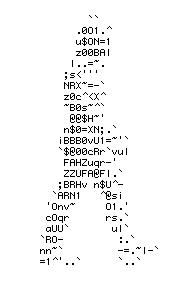Marc Glaser beginnt bei
http://ojr.org mit einer Serie zur Geschichte und Zukunft des Online-Journalismus.
Erschienen ist nun der erste Teil mit als Experten:
John Battelle is director of the business reporting program at the University of California, Berkeley, founder of The Industry Standard, and co-founding editor of Wired.
Ana Marie Cox She was an editor at Suck.com, Feed.com, Mother Jones and Inside.com. She now lives in Virginia and works for a large multinational corporation and writes The Antic Muse Weblog when her bosses aren't looking.
Bernard Gwertzman is a longtime New York Times correspondent and editor whose last job for the Times was as editor-in-chief of nytimes.com (1995-2002).
Craig Newmark founded craigslist.org, a modest site where people can find a job or a place to live, or can address other everyday needs.
Dave Winer started the Scripting News Weblog in 1997, the longest currently running Weblog on the Net, and has written the online DaveNet column since '94. He currently is a fellow at the Berkman Center for Internet & Society at Harvard Law School.
OJR: What's the most exciting new development in online journalism, and why?
Winer: RSS. Because it levels the field. On the same page I read reports from BBC, The New York Times and my favorite Weblogs. I'm not more impressed by Glenn Fleishman, for example, when he writes for his Weblog, or when he writes for The New York Times. It makes online journalism more competitive and it desperately needs more competition.
Gwertzman: The ease of browsers receiving news, and the smooth insert of multimedia into the news coverage. The advent of broadband everywhere means that it is so easy to receive news that it is revolutionizing the news business.
Newmark: Some of the group blogging and discussion mechanisms, like MetaFilter and Slashdot, but they're all in their infancy. I do agree that image-enabled mobile phones will become important, but filtering is the biggest deal in this area.
Cox: This space left intentionally blank.
Battelle: The resurgence of advertising revenue to the Internet content model. It will allow journalists to once again innovate online.
OJR: How important are Weblogs in the history of journalism, and how do they differ from personal home pages?
Winer: Weblogs drop the cost of publishing to near zero, making it possible for anyone with information or ideas to publish them. It's a huge change. Before, I used to get quoted occasionally by reporters, and they'd select the sound bites that were important to them, not me -- and they'd often mangle the quotes. It never served to get the ideas out that I wanted to get out. Now I can do it myself and have been since 1994. A lot of other people do it too now. About being different from the personal home page, geez, Weblogs are the personal home page. The difference is that Weblogs change and old PHPs were cute, and maybe a little snazzy, but never changed.
Battelle: Weblogs are quite important, I'd wager, in the way desktop publishing was in the late '80s. They democratize the printing press for the Internet medium. As to the second part of the question, the intent of a Weblog publisher seems, for the most part, quite distinct from that of a personal home page. Weblogs are updated frequently and content-driven, whereas personal home pages, at least in the past, have been "brochureware" for the most part.
Newmark: I think that they've started to provide first-person, really honest news, and some, like MetaFilter, are collecting news in serious ways that mean something. The good aggregators provide a good collection of trustworthy items, something personal home pages never do.
Cox: I don't know how important Weblogs are to the history of journalism. I certainly don't think that Andrew Sullivan brought down Howell Raines, if that's what you're asking. But there's an echo-effect at work right now that has made Weblogs seem influential, largely because traditional news organizations have bought the idea that they are.
That said, I think what's really revolutionary about Weblogs isn't their content, but the way that Weblog software has enabled technically unsophisticated people to produce aesthetically pleasing, well-organized Web sites. This is how blogs are different from personal home pages, and why blogging software could be to online journalism what PageMaker and Quark were to magazines: It may allow blogs to have the same effect on traditional journalism as zines did. Which is to say, a few big-name blog authors will get hired by major media publications to zing up their lame output. They will then become disillusioned and leave to write extremely mannered, hugely popular memoirs based on the experience of raising their orphaned little brother. (Is Glenn Reynolds destined to become the Dave Eggers of blogging? Discuss.)
Also, as it was for the short-lived zine revolution, the simplicity of the new technology has enabled some talented people without formal training to be recognized for their intelligence and wit. I am for this; the rewards of reading something great are well worth the hours of slogging though warblogs, moblogs, etc. Two of my own favorite blogs -- The Major Fall, The Minor Lift and (excuse the language) Dong Resin -- are put together by proudly unprofessional journalists. I find their content much more reliably informative and hilarious than pretty much anything published by people who get paid to do so.
Hier weiterlesen:
Online News Pioneers See Lots of Changes in the First 10 Years.





















